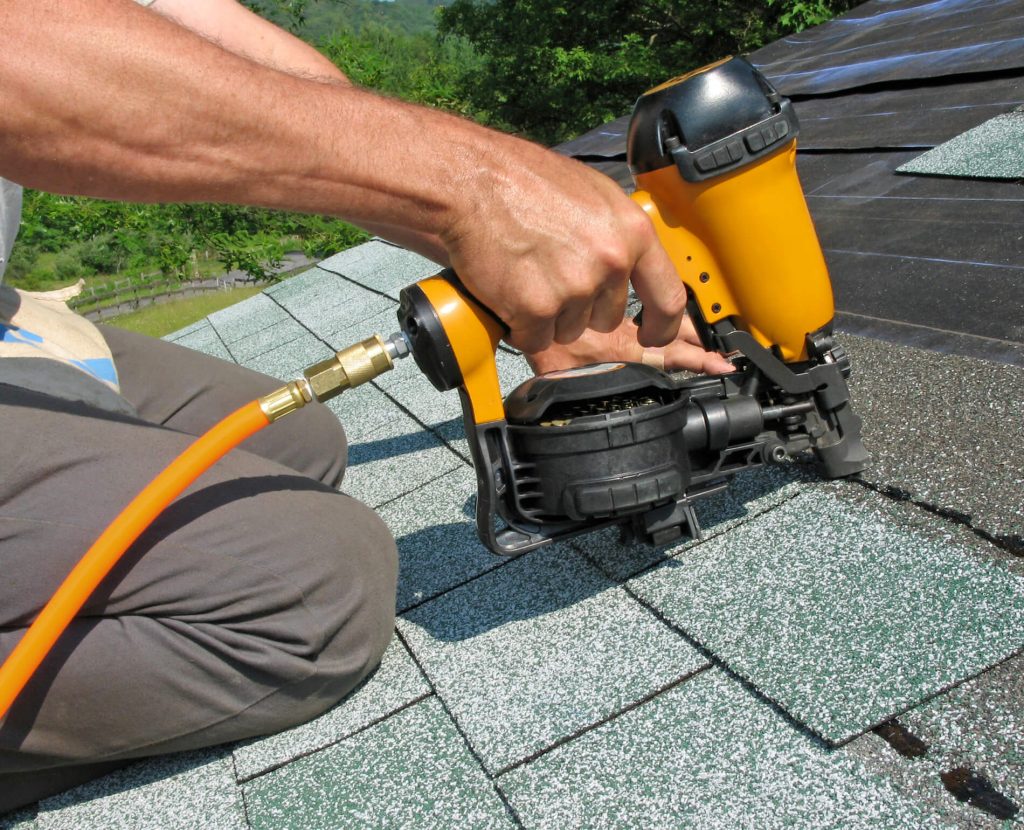Summary:
- DIY roof replacement can save you thousands of dollars on labor, but it’s physically demanding and can be dangerous work. Make sure you’re comfortable working at heights, have the right safety gear, and can handle heavy materials before starting.
- Check with local authorities to see if you need a permit before starting any work. You’ll also need to have a roofing nailer, circular saw, safety harness, underlayment materials, and shingles on hand.
- DIY costs range from $2,000 to $6,000—far less than the $10,000 to $12,000 most professionals charge. You’ll need to tear off old shingles, install underlayment, secure shingles to the roof, and seal any edges.
- Roof Maxx provides a safe, eco-friendly alternative to roof replacement that can extend the life of your shingles by five years or more at a fraction of the cost. This can help you save money if you aren’t ready to invest in a new roof.
Replacing your roof is one of the most labor-intensive and expensive home maintenance projects. It’s also one of the most necessary. Asphalt shingles, the most common type of roofing for homes and many businesses in the United States, dry out and break down over time. That means there’s a good chance your roof will need to be replaced in the not-so-distant future.
Replacing an asphalt roof is something you can do yourself. It takes A LOT of work and requires very specific steps, but it can be done. DIY roof replacement would save a lot of money in labor costs, and you can get a great sense of satisfaction from doing it yourself.
Read more: How to Install Roof Shingles: A Step-by-Step Guide
What Do You Need to Reroof Your House?
DIY roof replacement will save you thousands of dollars on labor costs. There are significant material costs, though, and that includes much more than just shingles. There are several tools and safety equipment you need.
Physical Requirements
The first thing you need for DIY roof replacement is the ability to work on your roof. That is no small task. It requires the ability to work safely up high. You can test yourself by getting on your roof and safely walking around. If you find this difficult, then replacing your own roof might not be for you.
Roofing also requires the ability to lift heavy packs of shingles, which can be taxing on your back, shoulders, arms, and legs. Speaking of legs, roofing requires a lot of working on your knees. The savings that come from doing your own roof are not worth any long-term injury, so be very careful and honest in your personal assessment.
Permits
Depending on where you live, you may need a building permit from your city or county. You can check with your city or county officials to find out what permitting is needed. Roofing is a very conspicuous project, so make sure you have the necessary paperwork in place before you start.
Tools
Roofing requires a very specific set of tools. You need the right tools for cutting and securing the roofing materials in place. You also need the proper safety equipment. Again, keeping yourself safe is priority number one.
The tools you will need for your DIY roof replacement include:
- Air compressor and air hose (you can rent compressors and other tools)
- Roofing nailer
- Circular saw
- Caulk gun
- Stapler
- Utility knife and blades
- Tin snips
- Straightedge
- Safety harness and fall arrest system
- Work gloves
Roofing Materials
Now for the obvious expense, the roofing materials. To replace your asphalt roof, you will need:
- Underlayment
- Asphalt shingles
- Sealant
- Roofing nails
- Drip edge
- Flashing for dormers, vents, and valleys
- Hook blades
- Sealant
- Staples
How Much Does DIY Roof Replacement Cost?
Why should you do DIY Roofing? The primary motivation is savings. The cost of roofing your house will depend on several factors, from the size of your roof to the type of shingles and even your location.
On average, the cost of reroofing yourself would run between $2,000 and $6,000. Compare that with paying a roofing company, which would cost between $10,000 and $12,000.
Understanding the Roofing Process
In addition to the necessary safety precautions and physical requirements of roofing, the process involves following the right steps. These steps include:
- Tearing off the old shingles
- Installing the drip edge
- Applying the underlayment
- Covering the roof with felt paper
- Installing flashing and waterproofing valleys and edges
- Ensuring proper overlap to prevent leaks
- Installing and securing the shingles
- Trimming edges
- Installing dormers and vents
- Sealing around pipes and vents
- Capping the ridge
- Sealing your work
It’s a detailed process, but you can follow the steps, talk with people who have done it, and carefully work through the details.
DIY Roof Replacement Isn’t for Everyone
Replacing your own roof isn’t for everyone. It requires a lot of physical work, time, and attention to detail. It can also be dangerous and is not for anyone with a fear of heights.
Fortunately, there are alternatives to roof replacement. Before you spend thousands of dollars paying for a roof replacement or days of work doing it yourself, you should look into roof rejuvenation from Roof Maxx.
Even old asphalt roofs can benefit from Roof Maxx. It’s an all-natural bio-oil that restores your shingles’ ability to keep the structure below safe from the elements. Plus, an application of Roof Maxx costs just 15-20% what you would pay a roofing company for replacement.
A single application of Roof Maxx instantly adds five years of life to your roof, and it can be applied up to three times, every five years, for up to 15 years of added roof life and savings.
Read our reviews and see why people love Roof Maxx. Call us today for a free quote.





